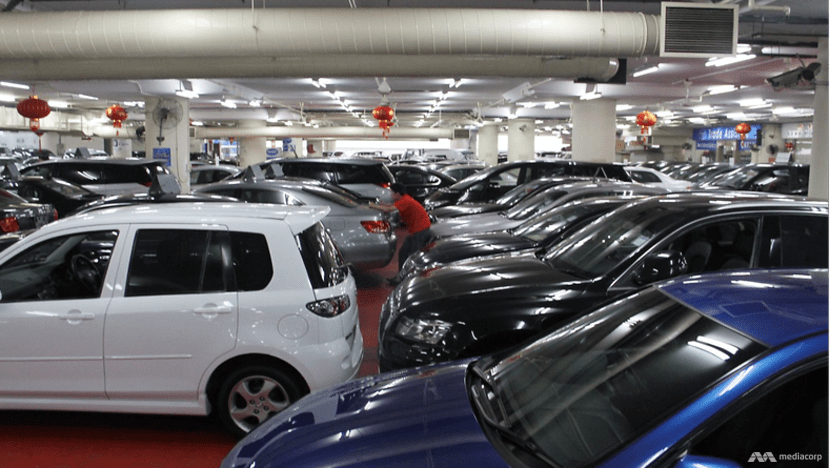COE premiums could continue rising amid record-breaking rally, say car dealers and analysts

A car showroom. (TODAY file photo)
SINGAPORE: Certificate of Entitlement (COE) premiums could still climb amid a continuing lack of COE supply and steady demand from affluent buyers, car dealers and transport analysts said on Wednesday (Jul 6).
This comes after the premium for the Open Category COE - which can be used to register any vehicle type but tends be used for larger cars - hit S$110,524, breaking a record that had stood since December 1994 when the then-Category Four classification peaked at S$110,500.
Premiums also went up across the board. In Category A - for cars 1,600cc and below with horsepower not exceeding 130bhp - premiums closed at S$78,001, up from S$74,989 in the last exercise. Category B COE premiums rose to S$107,800 from S$106,001.
Ms Sabrina Sng, managing director at Wearnes Automobile, predicted that the COE quota for August to October will be cut by between 15 to 20 per cent, amid a low number of deregistrations from April to June.
According to the latest Land Transport Authority (LTA) data, 4,131 and 3,501 vehicles were deregistered in April and May respectively, the lowest figures so far in 2022.
"In May there was quite a big dip and June continues to be low. If June is actually the same as May, I think we extrapolated and (the next COE quota) could be something like 20 per cent down," Ms Sng told CNA.
"I do foresee that prices will continue to go up as we move into the real quota cut period, obviously when you have 15 to 20 per cent down in supply."
Even so, Ms Sng pointed out that there are some who will still buy cars despite the costly premiums, out of "need" and a fear of even higher prices in the near future.
"Besides the immediate quota reason, there are other factors like the impending GST hike next year, and interest rates look to be rising even further. So, it's like sort of bite the bullet and buy now rather than later when other costs could also escalate," she explained.
AFFLUENT BUYERS DRIVING DEMAND
Those who are still buying cars include people who want to avoid public transport amid the ongoing pandemic, Assistant Professor Terence Fan of the Singapore Management University (SMU) said, although he suggested that COVID-19 concerns were "much less" now.
"So, that leaves this other big question mark, which is this influx of foreigners, and I think that is probably the most credible increase somewhat driving this demand," he said.
Asst Prof Fan highlighted how the Monetary Authority of Singapore had approved 100 applications to set up family offices in the first four months of 2022. Family offices are private wealth management advisory firms that serve ultra-high-net-worth individuals.
He also cited media reports on soaring rental prices in Singapore driven by foreigners with "money to spend" and have moved here to escape harsher COVID-19 restrictions elsewhere.
"Having gone through what they've gone through, I think they're sort of like, 'Hey, life is short. Let's kind of make sure our life is good','' he said.
"So until this stream of people settles down, I don't see how this trend is going to revert itself."
Mr Eddie Loo, managing director of CarTimes Automobile, said "many millionaires" have come to Singapore and are looking for a house and car.
"These people don't even bother about COE, just when they can get the car, that's all," he told CNA.
Likewise, he said the decreasing supply of COEs will continue to push up premiums, and backed the Open Category to breach the S$120,000 mark.
"People would not want to wait for the next wave of decrease in quota which will be more severe," he said. "So, a lot of people rushed in to bid. That basically caused the upward trend of the COE premium."
The continuously high COE premiums also create a "vicious cycle", Ms Sng said, pointing out that people will be less inclined to scrap and deregister their cars in this climate due to the high cost of buying a new vehicle.
"Of course, we are seeing some recessionary trends, economic downturns ... that might dampen demand, but I feel that because COE supply is so little, the moment there is a dip in premiums somewhat, people will then rush in," she said.
"There are a lot of people who want to change cars, just waiting on the sidelines for the price to be sort of right, to their acceptable level."
WHEN WILL PREMIUMS GO DOWN?
Mr Loo said premiums will go down only when the COE supply is restored, likely in 2024 or 2025 when more vehicles will be deregistered as COEs from the bumper crop in 2015 expire.
"I think it's unlikely the prices will moderate significantly until we reach the point in the cycle where we have large supply coming back online," Associate Professor Walter Theseira from the Singapore University of Social Sciences told CNA.
"The large supply of COEs in this 10-year cycle coincides with many people purchasing mass-market cars. So, those are the ones who have much less ability to pay if they're considering replacing their cars."
Despite that, Assoc Prof Theseira, who heads the Master of Management (Urban Transportation) Programme, feels that premiums will not return to the low levels seen in 2015.
"Given that COE supply is essentially fixed for cars by policy, and given that in a couple of years - assuming the economy does well, our plans work out - we will continue to see growth at the high end of Singapore consumers and residents," he added.
"My personal belief is that it may not return to exactly what it was in 2015. Because basically people have gotten richer, and the distribution of income has also moved up a bit."
LTA announced in 2017 that it would halt car population growth until 2020, citing land scarcity and investments in public transport. In 2020, the zero growth rate policy was extended to 2022 amid uncertain travel demand due to COVID-19, before being further extended to 2025.
SMU's Asst Prof Fan does not think that LTA will relax the policy to continue "pushing" commuters to public transport, although he said authorities could be waiting for train and bus ridership to return to pre-pandemic levels before making a decision.
"I think they're going to wait till the ridership increases closer to the pre-COVID numbers before they decide maybe to release the car population net growth, and with the growth then obviously your prices will come down," he said.
Mr Loo from CarTimes suggested that the Government could also increase the short-term COE supply to push down prices, saying that it would have projections on future supply and could easily reallocate the quota.
"Okay so from now on, you know how many COEs there will be every year," he said, describing what the new system could look like. "Then I won't care about the price, because anyway, it's zero growth."













